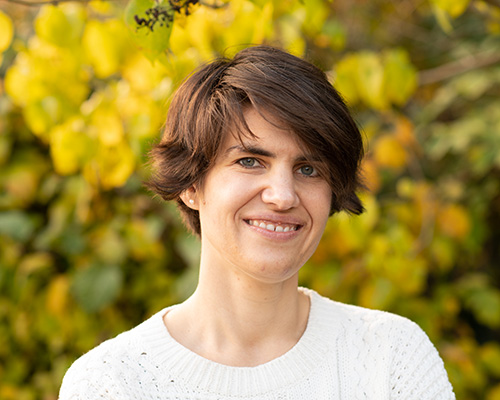Lundbeck Fellows 2018 Amelie Stein, Biomolecular Sciences
Amelie Stein, Assistant Professor in the section for Biomolecular Sciences, is one of the 5 recipients of the 2018 Lundbeck Foundation Fellowship, which will support each Fellow’s research for 5 years with 10mDKK.
Amelie’s project aims to tackle one of the most important problems in current biomedical research, namely how to utilize the explosion in genome sequencing to improve diagnosis and treatment of patients. Her interdisciplinary research combines computational modelling with high-throughput data generation, enabling her to study this problem at a depth not possible before.

Amelie has a university degree in computer science and bioinformatics from the University of Tübingen, Germany. During her PhD at the Institute of Research in Biomedicine, Barcelona, Spain, she developed tools to model and analyse protein structures. As a postdoc at the University of California San Francisco, she used high-throughput genetic interaction screening to look at cell-wide consequences of genetic changes in yeast. Recently, in collaboration with several other groups at the Linderstrøm-Lang Centre for Protein Science at the section for Biomolecular Sciences, she has started to look at how genomic variants affect proteins. “We can model about two thirds of protein variants quite well, but this work has also highlighted the challenges for the remaining third.”
Interpretation of the consequences of genetic variants is becoming ever more relevant, as human genome sequencing is becoming routine in clinical and research settings. Each of us carries a number of small genetic variants, yet interpretation of the vast majority of these changes remains challenging. Amelie’s research will be focusing on the influence these gene variations have on the proteins in our body.
- “Only 1% of our genome codes for proteins, but proteins perform the great majority of our bodies’ functions – such as transporting oxygen through the blood – so this is an extremely important 1%. My aim is to develop methods for predicting how protein variants affect the cell, and to be able to pinpoint the ones that cause disease,” she says. “Our recent work shows that we need better models for many of the clinically relevant changes. Thus my group will work in a close feedback cycle on screening protein variants, and improving modelling approaches. This learning loop will let us make greater advances than just looking at one side of the question.”
Amelie’s work aims to determine not only which variants lead to disease, but also provide insight into the underlying mechanism by testing how cells respond to variants. With this mechanistic understanding, we can design experiments to study individual variants in greater detail, and also provide starting points for the development of therapeutic approaches.

Kontakt
Post doc Amelie Stein
Section of Biomolecular Sciences, Department of Biology
Mail: amelie.stein@bio.ku.dk
Tel: +45 2991 3981
Press & Communication
Helle Blæsild
Department of Biology
Mail: kommunikation@bio.ku.dk
Tel: +45 2875 2076
